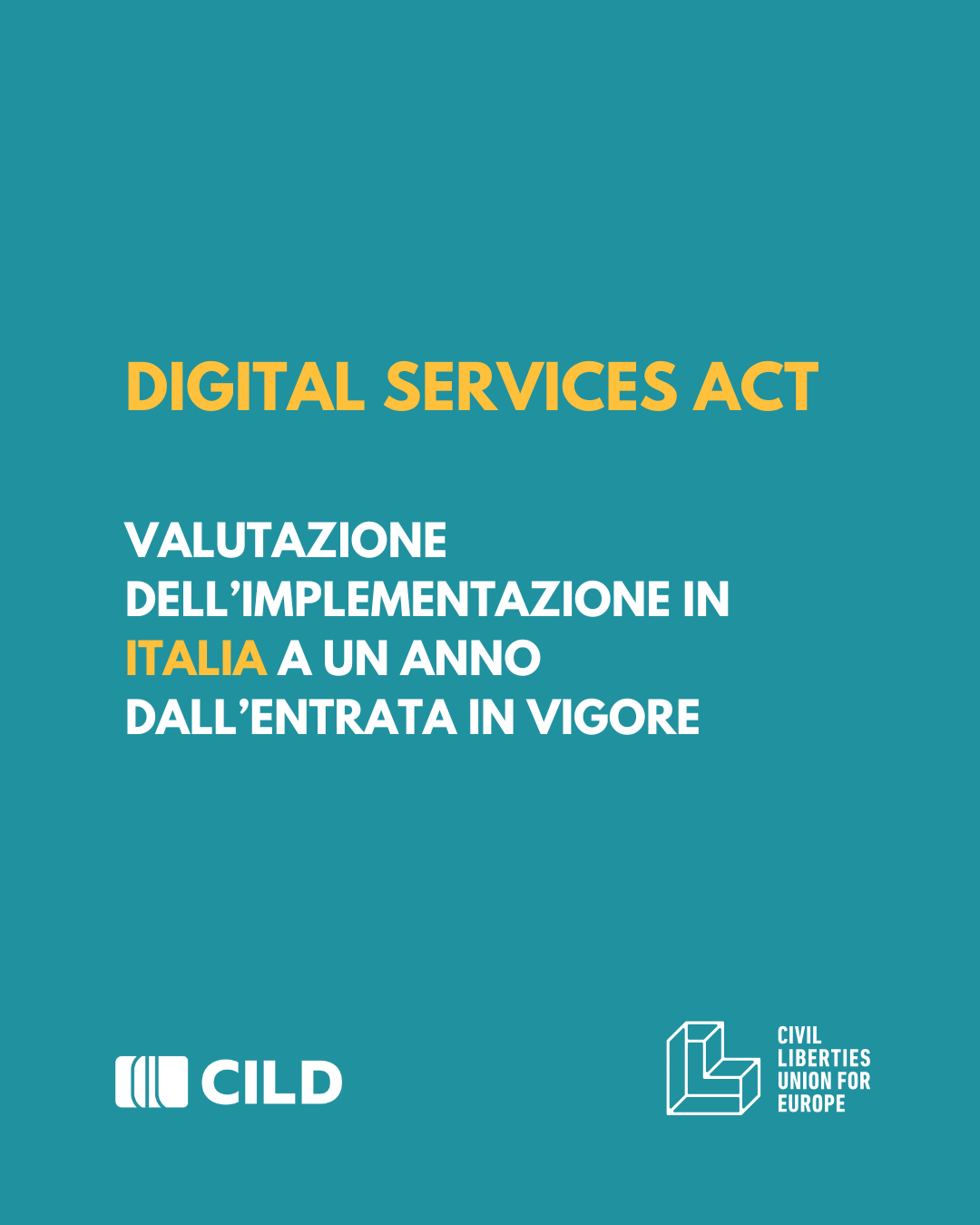Digital Services Act: an assessment one year after it came into effect
– Sara Gherardi
Digital Services Act – An assessment of its implementation in Italy one year after it came into effect
On this the first anniversary of the Digital Services Act coming into force, we have looked at its implementation in Italy in collaboration with Liberties. In particular, we have analysed the role of the Digital Services Coordinator: the authority in charge of monitoring the implementation of the DSA. We focused on examining the legal independence, transparency, political and private sector interference potential of the DSC. Despite some challenges, Italy demonstrates a good level of compliance with and implementation of the DSA’s provisions.
The Digital Services Act (DSA) is a European Union regulation designed to make digital environments safer for users. At a national level, the responsibility for enforcing these rules outlined in the DSA lies with the Digital Services Coordinators (DSCs).
In Italy, this role has been assigned to the Autorità per le Garanzie nelle Comunicazioni (AGCOM), within which a dedicated Digital Services Coordinator Office has been established (Article 15 of Decree Law No. 123/2023).
AGCOM’s legal independence is established at primary law under Law No. 249/1997. However, it is not explicitly mentioned in the Constitution, which instead affirms the principle of unity in the government’s political and administrative direction, placing its leadership in the hands of the Prime Minister and establishing ministerial responsibility for public administration. Nonetheless, according to legal doctrine, independent authorities justify (at least in part) their existence through the high technical complexity of the sectors they oversee and the expertise they provide, which guarantees their autonomy. Economically, the DSC Office’s budget comes from contributions paid by digital service providers operating in Italy. For this reason, it is independent of ministerial funding, although, despite CILD filing a FOI application, and receiving a response, it was not possible to access information on the office’s current budget.
However, our concern was peaked regarding the selection process for AGCOM’s leadership and its independence from political influence. The Authority’s commissioners are appointed by the Senate and the Chamber of Deputies, while its President is appointed by the President of the Republic on the proposal of the Prime Minister, in agreement with the Minister for Economic Development. As for the leadership of the DSC, in September 2024 Giulio Votano was appointed as Director of the Office. Despite references to appointment criteria – such as merit, knowledge, and expertise in relevant sectors – no clear information was available on how the selection process was carried out in practice.
Regarding private sector influence, the legal framework governing public administration employment, transparency, and anti-corruption measures in the public sector establishes clear rules and guidelines to regulate conflicts of interest and cooling-off periods for personnel moving between the private and public sectors. However, there is still a lack of specific laws regulating lobbying activities, which could have implications for the monitoring of digital services, given the strong presence of private stakeholders.
AGCOM is required to hold hearings and present annual reports to Parliament, covering detailed information on the Authority’s activities, including those of the DSC Office, and are publicly accessible to ensure transparency. Furthermore, AGCOM conducts public consultations to support research and studies. As the DSC Office within AGCOM is still in its early stages, formal mechanisms for civil society engagement have not yet been introduced. The publication of guidelines for recognising trusted flaggers, who will be involved in monitoring the DSA’s implementation, represents progress towards a co-regulation model. However, it is too early to assess its concrete effects.
In conclusion, the role of the DSC has been assigned within the expected timeframe, and a dedicated office has been established within AGCOM. The independence of this supervisory authority is safeguarded both legally and economically, but it appears to be at risk of political influence, particularly due to the selection process for its leadership. Independence from the private sector, on the other hand, is well protected, although the authority remains vulnerable to lobbying activities.Regarding transparency, AGCOM’s accountability to Parliament is adequate, while mechanisms for dialogue with civil society are still in development.
Therefore, Italy has so far demonstrated a fairly good level of compliance with and implementation of the European Digital Services Act, but it is still too early to determine how effectively this compliance will be maintained as the office fully begins carrying out its duties under the DSA.
This assessment of the Digital Services Act’s implementation, conducted in collaboration with Liberties, also covered Bulgaria, Croatia, the Czech Republic, Germany, and Romania.
You can find the full report here: Monitoring the Implementation of the DSA.





